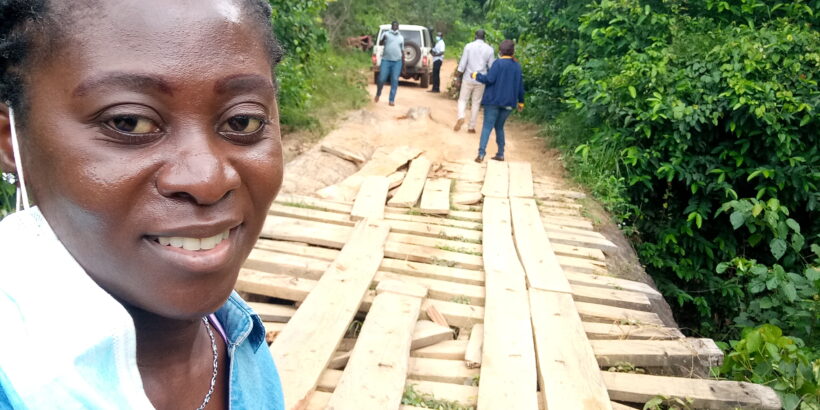There are more than 9 million cases and 133,000 deaths from typhoid each year, with the highest burden among children and young adults living in low- and middle-income countries. But regardless of age, occupation, or geography, typhoid can pose a threat for travelers and local communities alike.
Patience Dapaah, a senior advocacy and communications advisor at PATH, based in Ghana, contracted typhoid while traveling in Liberia for work. In this interview, Patience recounts her experience with typhoid and reflects on the urgent need for prevention and access to vaccines.
This interview has been edited for length and clarity.
We understand you were in Liberia when you contracted typhoid. Can you tell us about how you came to be diagnosed with typhoid?
In May 2025, I traveled to Liberia for a convention. My colleagues and I enjoyed the hospitability of Monrovia, especially the good food. Our hosts ensured we had bottled water through our weeklong stay. When I returned home, I did not feel well. I had chills, nausea, and a general feeling of being unwell. I thought I was just tired from the travels so I went to a nearby pharmacy. The pharmacy staff tested me for malaria, which was negative, and gave me paracetamol and a three-day course of antibiotics.
Then I traveled to Banjul, Gambia, for work. I still felt weak and nauseous. I was unable to eat any food because I had stomach cramps. I could only drink coffee and bissap (hibiscus) for three days. On the day I left Banjul, I was so weak that I nearly called for a wheelchair; it took a lot of energy to walk around that day. The day after I arrived back in Ghana, I went to see my regular doctor, who ran typhoid and malaria tests. Both tests came out positive! He prescribed a three-day malaria course and a seven-day course of antibiotics for me. He also advised me to rest for three days.
Within days, I heard back from some colleagues who had also traveled to Liberia. At least ten of us were ill and five of us had tested positive for typhoid! It dawned on me that we—unvaccinated against typhoid—had traveled to a country where a good proportion of the population younger than 15 years old had been immunized against typhoid. We were vulnerable but did not realize it.
What was your experience during your recovery?
I was very weak from the disease and from being unable to eat any solid food for days. I was also a bit afraid to drink water, knowing that even bottled water could be unsafe. As a precaution, I boiled my water and rebottled it before drinking. I was able to eat solid food three days after I was diagnosed. I actually ventured to church one day; and I made it there safely, but someone drove me home because I was so exhausted.
I got a lot of rest and didn’t miss a dose of the medication. I worked from home for the first few days; I was able to sit up for a maximum of two hours, after which I had to lie down for some time and continue working later. I returned to the hospital after seven days and tested negative for both malaria and typhoid. I felt better after seven days but not fully well. I felt fully fit about 30 days after I was diagnosed.
What’s one thing about typhoid that you wish more people understood?
- Typhoid is infectious! A person who is diagnosed with typhoid should be very cautious to protect others from getting infected too. This is why handwashing is so important.
- It is very difficult to prevent typhoid without being vaccinated and or having access to clean water and improved sanitation. Even bottled water may still contain Salmonella typhi, which cannot be seen with the eye or identified with a simple litmus test. It takes a lot of precaution to avoid typhoid.
As someone deeply involved in global health advocacy and communications, how has your personal experience with typhoid influenced how you approach your work?
I continue to advocate for every precaution against typhoid: better access to clean water and appropriate sanitation for everyone, and for immunization against typhoid. This is my third episode of typhoid; I had it for the first time in 1994 and that was my worst episode. Incidentally, in 1994, a very brilliant schoolmate of mine also had typhoid. He had intestinal perforation and typhoid psychosis and died. Typhoid is a disease that should be taken seriously for people of all ages, not only young children.
What is your message to decision-makers considering how to prioritize TCV?
We should take implementation of typhoid conjugate vaccines (TCV) more seriously. Liberia has introduced the vaccine, and a good proportion of the eligible population has received it. The vaccinated children and adolescents are protected against typhoid so they’re less vulnerable than someone like me who has not been vaccinated against typhoid. I advocate for vaccine manufacturers to reduce the price so that TCV becomes affordable to more countries and individuals, particularly those that are not eligible for Gavi support. I also advocate for private pharmacies to stock TCV and make it available for people like me who stand to benefit from protection against typhoid as we travel.
Finally, I hope we can establish better typhoid surveillance to understand how TCV has reduced the burden of typhoid in countries where it is available. This information will encourage more decision-makers to consider TCV introduction to reduce the burden of typhoid in their country.
Cover image: Patience Dapaah, a senior advocacy and communications advisor at PATH, inspects a bridge for safety with her colleagues while traveling to a county in Liberia to conduct monitoring work—showcasing the great lengths that staff and partners go to while planning and implementing campaigns. Credit: Patience Dapaah.



